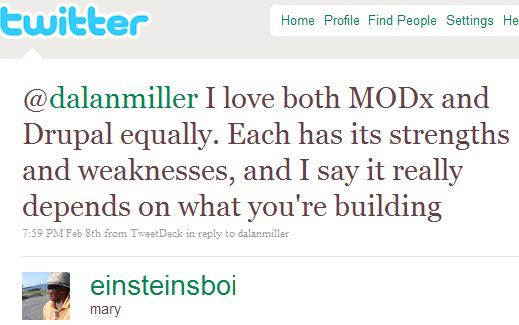In this interview I talk to Ryan Cramer, founder and lead developer of the ProcessWire project. Ryan has been kind enough to share with us some insights into who he is and into the ProcessWire project – what it is, where it came from, what’s cool about it, and where it’s going. Whether you’re an avid ProcessWire fan or have never heard of it, I hope you find this post interesting, useful, and informative. Continue reading “Interview with Ryan Cramer – ProcessWire CMS Founder and Lead Developer”
Category: Interviews/People
An Unexpected Conversation with a Hacker
Before I proceed, I want to state that I don’t know Verite’s gender, I didn’t ask. So my references to “he” and “him” are purely an assumption on my part. What I do know as facts is that Verite identifies himself as a hacker and reports that he is a teenager.
Yesterday afternoon (Kiwi time), a user with the twitter handle @V3R1T3 sent me a tweet and asked me to pass on a message to the MODX team because they had “blocked” him. Initially, I wasn’t sure that I wanted to engage in conversation with Verite given that he had publicly admitted to defacing the http://modx.com website and had posted a pastebin with some MODX users account information on the web. However, given these facts, the fact that I run MODX on several sites and have an account at modx.com, and my own innate curiosity, I decided to respond, ask a few questions, and see what I could find out. The resulting conversation was quite interesting and I asked Verite if I could post the chat verbatim on this blog for anyone who might be interested. We chatted for a while on twitter and then moved the conversation to Skype.
To give this conversation some context, I will post a bit of background on the events that led up to it. Continue reading “An Unexpected Conversation with a Hacker”
MODx and Drupal – Some Thoughts
 Recently on Twitter I made the comment that I love MODx and Drupal equally. James Rotering from The CMS less traveled found that statement interesting and decided to dig a little deeper. He sent me some pointed and very detailed questions about my thoughts on the two CMSs and the results of that interview are now posted on his blog. These questions were interesting for me to answer because I realized I’ve always taken it for granted that each CMS has a place in my little world and I’ve just gone on blissfully enjoying having these excellent toys available to me and having the freedom to use one or the other. So this was a great opportunity to reflect on and analyze my own short history in web development and to articulate my thoughts and opinions (accurate or misguided as they may be 🙂 ). One wonderful side effect of doing this interview was a renewed appreciation for the developers of Drupal and MODx for sharing their wonderful creations with the rest of us, and for the amazing open source community out there that continues to support, enhance, extend, and make possible things that would otherwise just be a v ery expensive dream for most of us. So thank you all 🙂
Recently on Twitter I made the comment that I love MODx and Drupal equally. James Rotering from The CMS less traveled found that statement interesting and decided to dig a little deeper. He sent me some pointed and very detailed questions about my thoughts on the two CMSs and the results of that interview are now posted on his blog. These questions were interesting for me to answer because I realized I’ve always taken it for granted that each CMS has a place in my little world and I’ve just gone on blissfully enjoying having these excellent toys available to me and having the freedom to use one or the other. So this was a great opportunity to reflect on and analyze my own short history in web development and to articulate my thoughts and opinions (accurate or misguided as they may be 🙂 ). One wonderful side effect of doing this interview was a renewed appreciation for the developers of Drupal and MODx for sharing their wonderful creations with the rest of us, and for the amazing open source community out there that continues to support, enhance, extend, and make possible things that would otherwise just be a v ery expensive dream for most of us. So thank you all 🙂
Thank you James for the wonderful opportunity to be interviewed on your blog. Be sure to check out James’ other posts, he’s a great writer and I’m looking forward to reading more from him.
Interview with Jon Lebensold – PHP and Zend Framework Programmer Extraordinaire
If you’re a PHP programmer and or have some interest in the Zend framework, you’ve probably run across Jon’s name or heard his voice over at Zendcasts, where he produces and shares video tutorials/podcasts covering all aspects of the Zend Framework and PHP. He has also produced more video tutorial series over at KillerPHP, including a PHP Shopping Cart, WordPress themeing, Advanced PHP, and more.
 1. Hi Jon, can you tell us a bit about yourself? Where do you live, what do you do for a living, etc.
1. Hi Jon, can you tell us a bit about yourself? Where do you live, what do you do for a living, etc.
I’m a web developer living in Montreal, Quebec (that’s in Canada). I spend most of my days working on web applications as a freelancer and managing a website I started called Zendcasts. Zendcasts is a collection of online training materials centered around Enterprise PHP development. I’m also a member of the Bahá’í community and I maintain a blog at lebensold.net
Continue reading “Interview with Jon Lebensold – PHP and Zend Framework Programmer Extraordinaire”
Interview with Jason Coward (aka OpenGeek) – MODx Co-Founder & Lead Architect
In this interview, I talked to Jason Coward, MODx Co-Founder and Lead Architect and he gives us some insights about himself, the MODx project, and what’s coming. Enjoy 🙂
 1. Hi Jason, thanks for making the time out of your crazy schedule to answer some questions for us. Can you start by telling us a bit about yourself?
1. Hi Jason, thanks for making the time out of your crazy schedule to answer some questions for us. Can you start by telling us a bit about yourself?
My name is Jason Coward, and I am 38 years old. I am one of the original founders of the MODx project, founder of the xPDO project, and CTO of Collabpad, the company which supports the MODx Founders and makes the MODx project and community possible. I work from my home office on a mountain just outside of Taos, New Mexico, where I have recently relocated. I have a wonderful girlfriend, Christina, who I’ve been with for the past 16 years, and three male cats. I’ve been a drummer for over 25 years, playing a variety of styles including jazz, country, rock, and Americana. Pool is my game of choice, especially 9-ball. I also enjoy hiking, camping, and digital photography.
2. What is your development background? When did you start programming, what languages have you worked with? Continue reading “Interview with Jason Coward (aka OpenGeek) – MODx Co-Founder & Lead Architect”